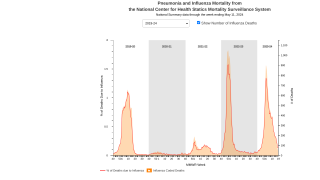Seniors Need Flu Shots Prior to International Travel

The European Commission has given regulatory approval for the 1st adjuvanted quadrivalent influenza vaccine designed to protect those aged 65 and over.
This new adjuvanted quadrivalent vaccine (aQIV) builds on the technology used in an existing adjuvanted trivalent influenza vaccine (aTIV) which is currently available in several European countries.
Announced by Maidenhead, UK-based Seqirus on June 8, 2020, this new vaccine is designed to give enhanced protection to people aged 65 and over in comparison to standard influenza vaccines.
Seasonal influenza – commonly referred to as flu – is a highly contagious infectious disease.
Influenza viruses are classified into 4 types: A, B, C, and D. Only virus types A and B commonly cause illness in humans.
The 4 influenza strains this Seqirus vaccine is designed to protect against are two A strains and two B strains, as opposed to a two A strains and a single B strain in the currently available flu vaccines.
By the additional B strain into the new vaccine, it can provide additional protection, as data from the European Centre for Disease Prevention and Control (CDC) showed that nearly half of all fatalities in 2017 and 2018 from influenza in intensive care were due to B strain viruses.
The European CDC estimates that 15,000-70,000 people in Europe die from flu-related complications each year.
Furthermore, aging can make people more vulnerable to catching influenza and can reduce the body’s immune response to flu vaccinations.
The adjuvant added to aQIV is designed to boost the immune response in older adults and to help compensate for this effect.
Dr. Raja Rajaram, Seqirus’s Head of Medical Affairs, Europe, commented in a press statement: “In these times, even more than in most, it’s important to have age-appropriate vaccines to help protect against influenza.”
“We know that people who get vaccinated are less likely to become ill with influenza.”
“This will potentially help to keep pressure off health systems during continuing concern over COVID-19.”
“As a company, we are very focussed on developing vaccines that offer better protection for people who are particularly vulnerable to influenza. We are delighted to be able to bring this vaccine to Europe, which offers healthcare professionals an additional tool on the front line of influenza prevention.”
The new vaccine will be manufactured in Liverpool, UK, by one of Europe’s largest flu vaccine producers, Seqirus, and the approval for marketing authorization means the vaccine will be available for use by 2021/22.
The US Centers for Disease Control and Prevention (CDC) say ‘everyone 6 months and older should get a flu vaccine yearly, preferably in the fall before the northern hemisphere flu season begins.’
Including international travelers.
The risk of exposure to influenza during travel depends on the time of year and destination.
In temperate regions, influenza typically circulates at higher levels during colder winter months: October to May in the Northern Hemisphere and April to September in the Southern Hemisphere.
In many tropical or subtropical regions, influenza can occur throughout the year.
Influenza viruses spread from person to person, primarily through respiratory droplet transmission, such as when an infected person coughs or sneezes near a susceptible person.
Most adults who are ill with influenza shed the virus in the upper respiratory tract and are infectious from the day before symptom onset to approximately 5–7 days after symptom onset, says the CDC.
People should get vaccinated at least 2-weeks before travel because it takes 2-weeks for vaccine immunity to develop after vaccination.
Also, the CDC says ‘even if you receive the previous season’s vaccine before travel during the summer months, you should still receive the new flu vaccine that coming fall or winter.’
Influenza is caused by infection of the respiratory tract with influenza viruses, RNA viruses of the Orthomyxovirus genus.
Vax-Before-Travel publishes international flu shot news.
Our Trust Standards: Medical Advisory Committee
























